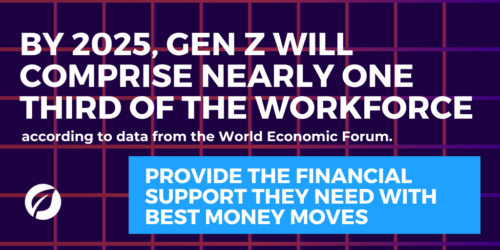3 financial struggles faced by Black and Latinx Gen Zers — and how companies can help. The number of Gen Z employees entering the workforce is on the rise. Here’s how to address the unique challenges facing the Black and LatinX Gen Zers on your team.
By 2025, Gen Z employees will comprise nearly one-third of the total workforce, according to data from the World Economic Forum. According to the U.S. Census Bureau, they’re also the most diverse generation yet.
When it comes to financial issues, Gen Z already has a different approach than previous generations. But when you factor in race, ethnicity and gender, Black and brown young adults disproportionately experience more economic headwinds.
By taking a deeper look at the financial struggles unique to Black and brown young adults, companies support their newest generation of workers
3 financial struggles faced by Black and Latinx Gen Zers — and how companies can help
1. Black and Latinx Gen Zers have lower levels of financial education and literacy
In order for a benefits program to be successful, it needs to align with what employees want. A great way for employers to find out what their employees want is by conducting a needs assessment. These can be done in the form of personal interviews or questionnaires.
A recent trend in employee benefits has been an increased emphasis on financial wellness. 68% of employees said they would rather have financial wellness benefits than an extra week of vacation, per a Betterment report. Implementing a financial wellness platform is a great way for employers to signal to their employees that their wants and needs are a top priority.
2. Compare financial wellness platforms to find a comprehensive solution.
Black and brown Gen Zers have disproportionately lower levels of financial education and literacy, compared to their peers. Specifically, 42% of Latinx Gen Zers said they do not have investments because they don’t know where to start, compared to 27% of their non-Latinx peers, per a Bank of America survey. This lack of education and resources makes Black and brown Gen Zers limited in their investments and accumulation of wealth.
In addition, studies have shown that Gen Z women tend to have less financial know-how than their male counterparts. And for women of color, their lack of education is compounded, as they lie at the intersection of race and gender.
Solution: Invest in a well-rounded financial wellness program
Having a robust financial wellness program can help elevate employees’ financial wellbeing and education, regardless of their income or education level. With access to online resources like budgeting tools or loan calculators, employees can launch their financial education journey. Moreover, with a mobile-ready financial wellness program, employees can learn about stocks, investments and other financial topics, at the ease of their fingertips
2. Black Gen Zers are more likely to experience barriers to saving for retirement, such as debt
Preparing for retirement requires saving over time, but with looming debt it can be difficult to save for the future. According to a Bank of America study, Black Gen Zers are more likely to have student loan or credit card debt than their non-Black peers (60% vs. 44%) and twice as likely to cite debt as a barrier to financial success and retirement security. In turn, this exacerbates the disparity in retirement security between Black and brown Americans and their white counterparts.
Solution: Start a company match program for retirement contributions
Some companies have incentivized employees to save for retirement by instituting match programs, where employees have their retirement contributions matched by their employer, even if it’s a few dollars a year. Match programs can help employees multiply their retirement fund at a rate they likely can’t achieve on their own.
3. Family is a leading financial motivator for Latinx Gen Zers
Family lies at the cornerstone of Latinx Gen Zers’ financial priorities, more than their counterparts. Over 50% of Latinx Gen Zers say the definition of financial success is the ability to provide for their family’s future, including passing down generational wealth and making their parents proud. Moreover, Latinx Gen Z are more likely to start working at 15-18 to financially support their family financially than any other demographic.
Solution: Offer employees 1 on 1 financial advice
Managing multiple financial goals can be difficult, but with 1 on 1 financial advising, employees can achieve their most top of mind money goals — both long-term and short-term. Whether it’s helping sending money home or saving for a sibling’s college fund, financial advisers serve as a neutral, trusted resource to help employees balance their budget and multiple financial goals.
Need a financial wellness solution for your workforce? Try Best Money Moves!
Best Money Moves is a financial wellness solution designed to help dial down employees’ most top-of-mind financial stresses. As a comprehensive financial well-being solution, Best Money Moves offers 1:1 money coaching, budgeting tools and other resources to improve employee financial wellbeing. Our AI platform, with a human-centered design, is easy to use and fit for employees of any age.
Whether it be college planning or securing a mortgage, Best Money Moves can guide employees through the most difficult financial times and topics. Our dedicated resources, partner offerings and 700+ article library make Best Money Moves a leading benefit in bettering employee financial wellness.
To learn more about Best Money Moves Financial Wellness Platform, let’s schedule a call. Contact us and we’ll reach out to you soon.






